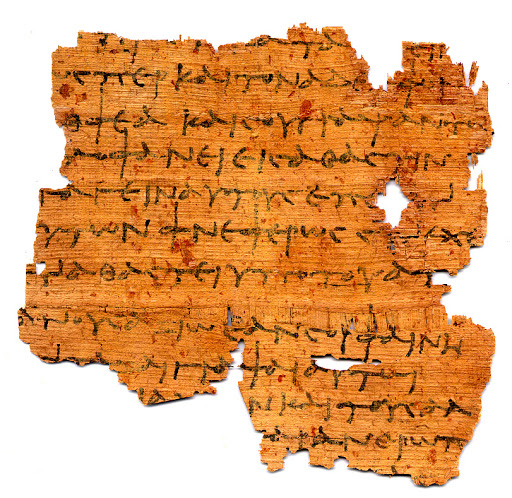
A feature film proved to be the ultimate recruiting tool for archaeology.
Thousands of fans of Raiders of the Lost Ark (1981) dreamed of becoming the next Indiana Jones – the fedora-wearing, bullwhip-cracking adventurer who fends off scheming Nazis, slithering snakes, and ancient curses to recover the world’s most priceless artifacts.
Real-life archaeology is considerably less dramatic.
In 1897, two British excavators made one of the greatest archaeological discoveries of all time. It was just outside the village of Oxyrhynchus (oxy-RINK-us), not far from the Nile River about 160 miles south of Cairo, Egypt. It wasn’t an ancient pyramid or sphinx or temple. It was a garbage dump – the place where villagers deposited their trash and emptied their wastebaskets some 18 centuries ago.
The Oxyrhynchus dump has turned out to be a treasure trove of ancient writings. During the last 123 years, diggers have uncovered more than one million fragments of papyrus. Most of them are exceedingly small – about the size of a cornflake, like the one pictured above.
Rather than dodging boulders and snagging golden idols, the typical work of archaeologists is to sit for hours in a library, painstakingly examining such tiny remnants. To date, only 1-2% of the Oxyrhynchus papyri have even seen the light of day. The rest are sitting in file cabinets, waiting to reveal their secrets.
As it turns out, a fragment scrutinized in 1925 by a Swiss professor named Albert Debrunner resolved one of the Bible’s enduring mysteries.
It concerns the only adjective in the Lord’s Prayer – the Greek word epiousion, which modifies the word “bread.” Jesus teaches his followers to pray, “Give us this day our daily bread.” That’s how most scholars, at least, have translated Jesus’ simple request.
But is “daily” the true meaning of epiousion?
The problem is that until 1925 no one had ever seen that word in all of ancient Greek literature, except in the New Testament books of Matthew and Luke. Speculation had been rampant. Some of the church’s greatest thinkers had suggested that Jesus was telling his followers to pray for a special kind of bread – presumably a super-spiritual heavenly substance. One scholar proposed “angel’s food.” Almost everyone, at least, agreed on this: Jesus surely wasn’t telling us to ask God for good old regular bread, the kind you stick in the toaster and slather with marmalade.
The Oxyrhynchus fragment changed all that.
Here, at last, was the word epiousion. It was on an ancient Egyptian grocery list that included chickpeas and straw. Contextually, the word means “just enough for today.” Jesus is indeed telling us to ask God for the bread we need to stay alive – but only the sustenance we need for the next 24 hours.
In the ancient world, bread was the pivotal, indispensable food item. The availability of bread meant the difference between life and death.
The mention of “daily” bread – the nourishment we need just for today – surely reminded his original listeners of God’s special provision for the people of Israel during their 40 years of wilderness wanderings between Egypt and the Promised Land. Shortly after dawn each morning (except on the Sabbath), thin flakes of a bread-like substance appeared on the ground.
The Israelites never did come up with a name for this free meal. In Hebrew, the words “What is it?” are ma nah. Thus the word “manna” literally means, “whattyacallit.” For four decades they gathered whattyacallit for breakfast, lunch, and dinner.
There was always enough – but just for that day.
If manna appears to have the makings of a fairly boring diet, author John Ortberg reminds us, “It was by all accounts an amazing product. It tasted like wafers made with honey. It was apparently a very versatile food. The Israelites were told to bake what they wanted to bake, boil what they wanted to boil, lay aside that which they wanted to eat raw. It sounds a little like Bubba in the movie Forrest Gump describing the infinite variety of ways in which you could fix shrimp. ‘Baked manna, boiled or barbecued manna, manna-on-a-stick, manna burgers, manna-salad, manna-cotti, manna-banana cream pie…’”
All washed down with a glass of manna-schewitz, no doubt.
The request for daily bread comes down to trust.
How would you feel if you caught your children or grandchildren smuggling food into their rooms – maybe a handful of Cheerios or a pancake or a slice of toast – and you subsequently learned they were doing this because they were afraid they might not get breakfast tomorrow morning? Just in case you let them down, they had better take care of themselves.
You would feel heartbroken. You would certainly not feel trusted.
So what’s happening in the Lord’s Prayer?
Jesus is telling us, “Even if you feel as if you’re in some kind of wilderness right now, you can trust your Father. He loves you. Your Abba will come through.”
He’ll provide everything you need for today.
No more.
But definitely no less.
